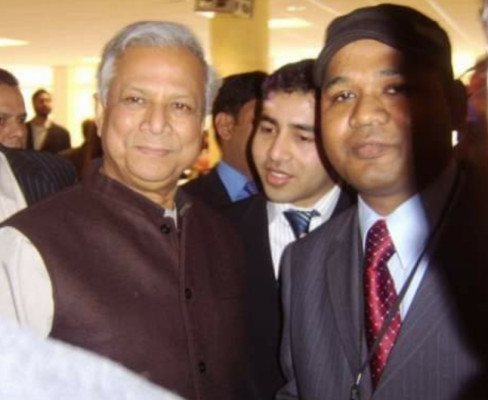By M A G Kibria
It has only been a month since the fall of Sheikh Hasina, and already the BNP and other political parties are pressuring the caretaker government to announce an election framework. This urgency seems misplaced and somewhat distasteful, giving the impression that politicians are in a rush to return to power. Have they forgotten that the bloody anti-quota movement was not a political one? The protest was a people’s movement, born from the government’s unbearable oppression, which had suffocated the nation for years due to the failure of politicians.
After the bloody struggle that claimed thousands of lives, it appears the country is entering a new dawn. Dr. Muhammad Yunus becoming the Chief Advisor is a significant step towards establishing good governance. However, his assuming responsibility came late. He could have led the nation 18 years ago when, as the first Bangladeshi Nobel Peace Prize winner, he was expected to bring leadership to the nation.
After the fall of the BNP government, Dr. Yunus was a top candidate for the role of Chief Advisor, but he declined the offer. Amid objections from the Awami League regarding judges appointed under the BNP government, President Dr. Iajuddin Ahmed himself took the role of Chief Advisor, forming an interim government that soon collapsed. Then, after the violent October 28 protests, the country narrowly avoided chaos through the intervention of General Moeen Uddin and Fakhruddin Ahmed.
The question now arises: Is Sheikh Hasina solely responsible for the 15 years of misrule, or should other political forces also be held accountable?
It’s true that the worst of Sheikh Hasina’s oppression was borne by BNP-Jamaat activists, with thousands injured, disappeared, or killed. But these opposition parties failed to mobilize a strong enough movement to free the nation from her tyranny. Will people forget the massacre of Hefazat-e-Islam at Shapla Square? The government forces brutally suppressed the protest, killing around 2,500 students by some accounts, yet Sheikh Hasina stayed in power.
Even after other opportunities arose, such as when Khaleda Zia was evicted from her residence and imprisoned, the BNP failed to galvanize a movement that could topple the government. Jamaat-e-Islami also alleges that their leaders were falsely tried and executed, but even after the deaths of over 200 protesters against the execution of Delwar Hossain Sayeedi, the opposition could not free the nation.
So how, after all these failures, do they justify their eagerness to seize power now, on the backs of the sacrifices of apolitical students and citizens?
The caretaker government will not hold power forever; political parties will eventually take over again. But we must be patient. This is an opportunity to reform the election system, the judiciary, the education system, and the economy and offer the people a new Bangladesh.
Dr. Muhammad Yunus is a beacon of hope for a post-revolution Bangladesh. Even after 50 years of independence, political rule hasn’t brought economic freedom, freedom of speech, or secured sovereignty. It’s no wonder that people have turned away from politics and politicians. Now, with a unique chance for reform and with an internationally respected figure like Dr. Yunus leading, we should give him the time he needs. Why are we rushing to power?
The Chief Advisor has rightly stated in his address that the last 15 years have destroyed every institution in Bangladesh—its judiciary, economy, and culture. It will take time to rebuild from these ruins. Encouragingly, it has been reported that the military has proposed giving the caretaker government six years. This period might even be extended if necessary, as Dr. Yunus has no political ambitions. The people trust that he will act with sincerity, honesty, and dedication.
There is no doubt about Dr. Yunus’s competence, sincerity, and effectiveness. However, my brief experience meeting him suggests that he may need to be more pragmatic and resilient to deal with Bangladesh’s messy political landscape.
After winning the Nobel Prize, Dr. Yunus was expected to bring leadership to the nation. He had even considered entering politics, sending emails to thousands for their opinions. However, the response was not as expected, and he eventually gave up the idea. During a reception hosted by the Mayor of Tower Hamlets in London, I asked him why he had stepped back from politics. His reply, tinged with bitterness, was a simple request to avoid discussing the topic, revealing that his political experience had not been a pleasant one.
Given this, it’s crucial that we don’t overwhelm Dr. Yunus with undue pressure. He has taken on a monumental task, and if the pressure becomes too great, he may walk away. But since he has responded to the nation’s call, we hope he understands that he will face many challenges and demands.
To Dr. Yunus, if you are reading this, I urge you to remain steadfast in your principles and promises. Even if it’s hard and time-consuming, stick to your goals and implement the necessary reforms in politics, economics, education, culture, constitutional institutions, defense, and internal affairs.
And, honorable Chief Advisor, you must not become a puppet of the military. Remember, Sheikh Hasina is not only a fallen dictator but also a relative and appointee of the current army chief.
You have to be tough to rid the country of corruption, which has permeated every sector. Pulling the country out of this swamp of corruption will take time. It will test your patience and determination, but don’t lose hope. The common people are with you, and you will succeed.
One of your greatest tasks will be to hold those accountable who have committed crimes over the last 15 years. You must ensure the return and trial of those who have killed, disappeared, or crippled thousands. Sheikh Hasina must be brought back from India to face justice, along with her associates who have destroyed, killed, and looted Bangladesh.
Regarding the military, Chief of Army Staff General Walker-uz-Zaman deserves both praise and criticism. He wisely realized that the military couldn’t control this people’s revolution and thus stepped aside, showing the red card to Sheikh Hasina. However, he also allowed her a safe exit, which was a mistake. He should have arrested Sheikh Hasina and her associates for trial. Additionally, he must answer for why he sheltered over 600 fugitive Awami League ministers and activists in the cantonment. Why did he protect them while they killed innocent students on Sheikh Hasina’s orders? He must also be held accountable.
Finally, you, Dr. Yunus, must be courageous to face all these challenges.










